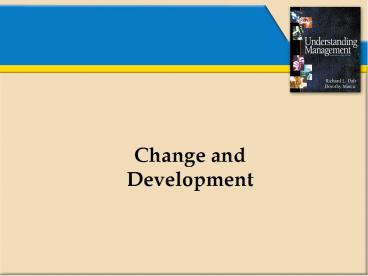Chapter 12 Change and Development PowerPoint PPT Presentation
1 / 17
Title: Chapter 12 Change and Development
1
Change and Development
2
OD Activities
- Team Building enhances the cohesiveness and
success of organizational groups and teams. - Survey Feedback begins with a questionnaire
distributed to employees on values, climate,
participation, leadership, and group cohesion
within their organization. - Large-group Intervention brings together
participants from all parts of the organization
to discuss problems or opportunities and plan for
change.
3
Organizational Change
- Four major types of change
- Technology
- General rule is that technology change is bottom
up. - New product
- Companies that successfully develop new
products - Horizontal linkage model emphasizes shared
development of innovations among several
departments. - Time-based competition is based on the ability to
deliver products and services faster than
competitors. - Structure
- Successful structural change is accomplished
through a top-down approach. - Culture/people
- Training is the most frequently used tool for
changing the organizations mind-set.
Continental Airlines
4
Two Types of Planned Change
- Incremental Change
- based on efforts to improve basic
- work and organizational processes.
- Transformational Change
- involves redesign and renewal of the total
organization.
5
Model of Change Sequence of Events
Monitor global competition, customers, competitor
s,
and other factors.
Evaluate problems and opportunities, define need
ed changes in technology, products, structure, a
nd culture.
Use force field analysis, tactics for overcoming
resistance.
Facilitate search, creativity, idea champions, a
nd venture
teams.
Consider plans, goals, company problems, and nee
ds.
6
Need for Change
- Based on external or internal forces.
- Performance gap-a disparity between existing and
desired performance levels. - Performance gap may occur because
- current procedures are not up to standard.
- a new idea or technology could improve current
performance.
7
Idea Champion
A person who sees the need for and champions
productive change within the organization.
8
Promoting Corporate Innovation
- New-Venture Teams
- Skunkworks
- Idea Incubator
The original skunkworks was created by Lockheed
Martin more than 50 years ago.
9
Facilitating of New Ideas
- Creative Culture
- Idea Champions
- New Venture Teams
- Idea Incubators
10
Resistance to Change
Managers and employees often seem to prefer the
status quo.
- Self-Interest the fear of personal loss is
perhaps the biggest obstacle to organizational
change. - Lack of Understanding and Trust do not
understand the intended purpose of a change, or
distrust the intentions. - Uncertainty the lack of information about future
events. - Different Assessments and Goals people who will
be affected by innovation may assess the
situation differently.
11
Using Force Field Analysis to Change from
Traditional to JIT Inventory System
12
Types of Organizational Change
SOURCE Based on Harold J. Leavitt, Applied
Organizational Change in Industry Structural,
Technical, and Human Approaches, in New
Perspectives in Organization Research, ed. W. W.
Cooper, H. J. Leavitt, and M. W. Shelly II (New
York Wiley, 1964), 55-74.
13
Horizontal Linkage
14
Technology Change
- Related to organizations production process.
- Designed to enhance efficiency.
- General Bottom-Up.
15
Changing People Culture Tools
- Training and development programs.
- Organizational development.
16
Organizational Development
- Can help managers address
- mergers/acquisitions.
- organizational decline/revitalization.
- conflict management.
17
Achieving Behavioral and Attitudinal Change
- Unfreezing
- diagnosis stage.
- participants are made aware of problems in order
to increase their willingness to change their
behavior. - Changing
- intervention stage.
- individuals experiment with new workplace
behavior. - Re-freezing
- reinforcement stage.
- individuals acquire a desired new skill or
attitude and are rewarded for it by the
organization.

